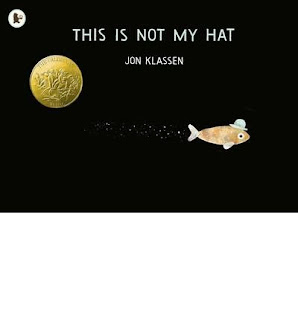"This is Not My Hat" by Jon Klassen
Summary
·
This book recounts the journey of a
fish who has stolen the hat of another, much larger, fish. The mischievous small
fish believes he has gotten away with his crime, but the large fish is onto him
and manages to get his long-lost hat back.
Analysis
·
Jon Klassen’s simple style wonderfully tells
this story by leaving just enough to the imagination of the child. The small
fish admits to the wrong he has done on the first page and draw in the young
reader with a hint of rebelliousness. It could potentially serve as a great lesson
in morality, (or karma) for a parent and child to share.
Because of it’s bare-bones style, much of
the story is being told via inference rather than directly, allowing the child
to practice drawing conclusions based on the well-chosen words and some very
telling features on characters. Not only are children learning to understand and
interpret clues in storyline, they are interpreting emotion based on subtle facial
expressions as well!
The ending of the story is expertly done,
although not actually told. The child can make the prediction based on the actions
of the large fish and tattle-tale crab about how the story will end. The story
isn’t directly told at this point. Klassen just shows us the large fish leaving
the tall grasses with his hat firmly on his head, thereby giving the child free
reign to tell the missing pieces. The readers’ imagination and creativity are
clearly very important parts of Klassen’s writing style.
Awards
·
Caldecott Medal, 2013


Comments
Post a Comment